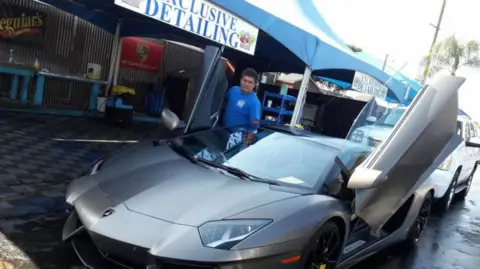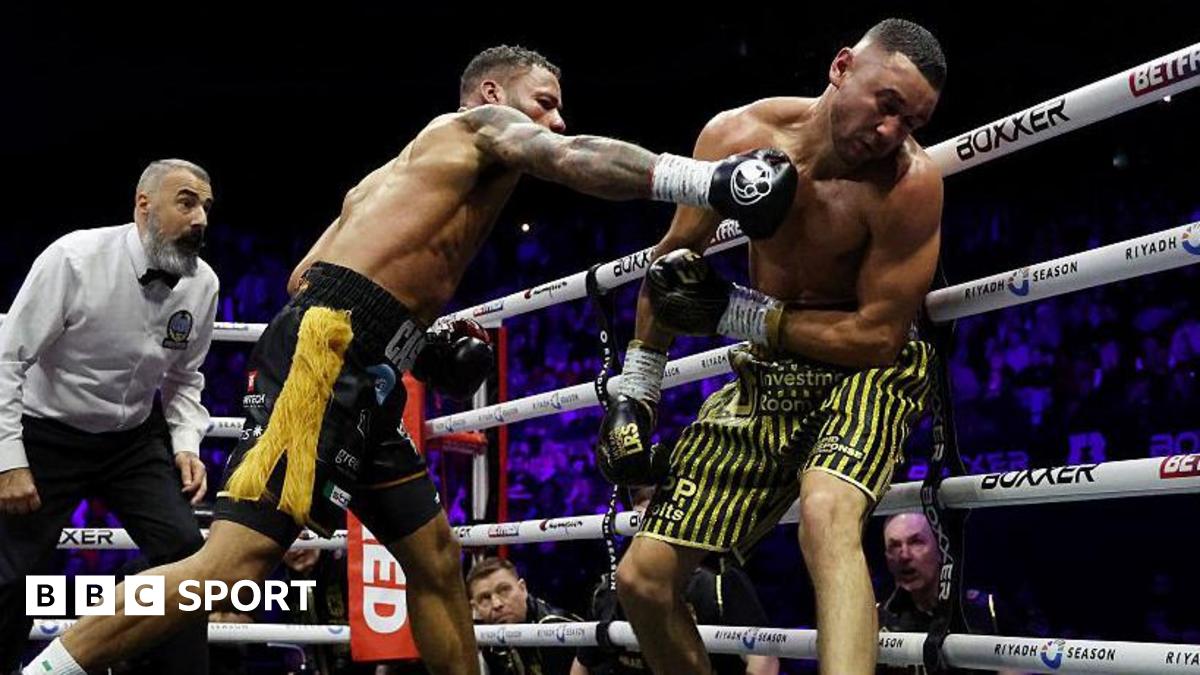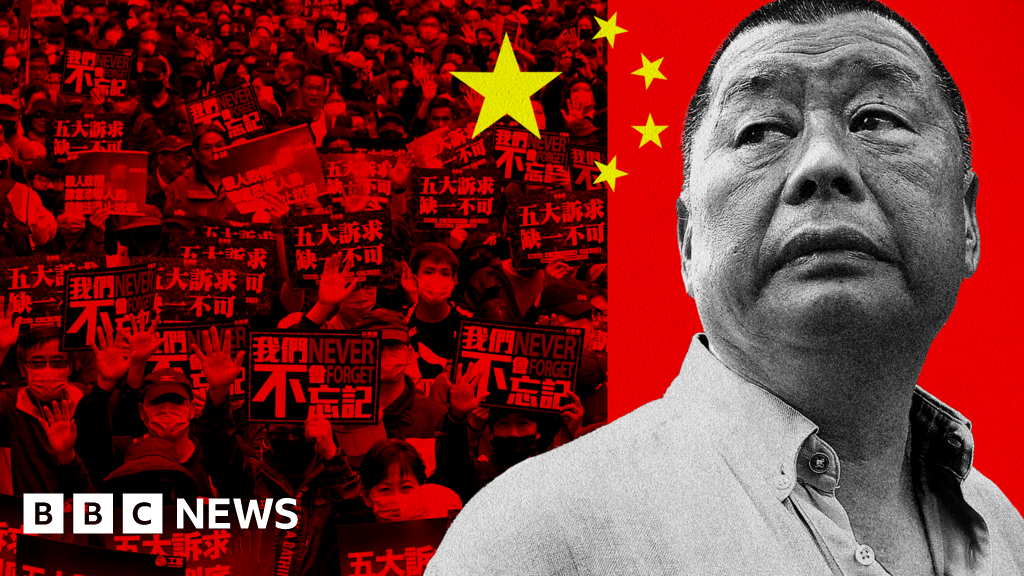Christal Hayes, Max Matza, John Sudworth & Alex Lederman
BBC News
Reporting fromLos Angeles
Watch: Surveillance video shows immigration raid at Westchester Hand Wash
When immigration agents pulled up outside a Los Angeles car wash on a quiet Sunday afternoon, it sparked instant chaos.
Some customers at the Westchester Hand Wash, which sits in the centre of a busy shopping area just blocks from the city's airport, froze as the officers in olive-green uniforms approached, CCTV footage obtained by the BBC shows.
Two employees who spotted them ducked behind a luxury SUV they were wiping down with a rag. Another worker halfway through cleaning the back window of a car looked up.
Then all at once they scattered and ran, some jumping over a nearby fence as agents raced after them on foot and in US Customs and Border Protection pick-up trucks.
Agents came the following day to make more arrests.

 Courtesy of Naomi Cruz
Courtesy of Naomi Cruz
Jesus Cruz had worked at the car wash for 10 years
Jesus Cruz, who has worked at the car wash for more than a decade and lived in the US for more than 30 years, was among the six men who were arrested over the course of two raids.
His wife, Noemi, told the BBC she was shopping with her daughter when she spotted a social media post about a possible raid. It included a photo of the car wash, so she dropped her daughter at home and raced there.
By the time she arrived, however, she was too late. She has not been able to reach her husband since.
"You are so used to having a partner there, just to help you out, to be the backbone… now it's like - how am I going to do it?" she said.
"My husband has no criminal background. He's never gotten a ticket before. We pay our taxes. We're up to date on everything."
The Department of Homeland Security (DHS) did not respond to an inquiry about Mr Cruz's legal status or the goal of the operation at the car wash.
The raid at the car wash, and similar ones across Los Angeles, represent a significant escalation in the White House's strategy to round up and deport undocumented migrants.
On the campaign trail, President Donald Trump repeatedly said he would prioritise deporting noncitizens accused of violent crimes. That promise received widespread support, even among Hispanic immigrant groups.
But in recent weeks, the administration has stepped up its targets, pushing to increase their arrests from about 660 to 3,000 a day.
To do that, they have widened their net, targeting not just criminals but workplaces where many undocumented workers do jobs that are vital for the economy - from farming to factory work - and pay taxes.
"Just go out there and arrest illegal aliens," Stephen Miller, a top White House adviser, reportedly told Immigration and Customs Enforcement officials before they launched the recent LA raids.
According to the Wall Street Journal, he told them they did not need to produce target lists of suspected illegal immigrants, a longstanding practice, and should instead raid major businesses to arrest as many as possible.
Car-wash owner Mehmet Aydogan said the agents did not ask for IDs before placing the men in handcuffs and swiftly driving them away.
"They were not doing anything criminal," he said, noting the raids were quick and lasted less than a minute. "Everyone is hard working."
Days earlier, another operation at Ambiance Apparel, a clothing wholesale business in the Fashion District near downtown LA, had set the city on edge.
More than a dozen people were arrested, witnesses said, although DHS did not respond to a BBC inquiry about this operation and the total number of arrests.
Border tsar Tom Homan denied that agents were conducting an immigration raid at Ambiance. He said it was a criminal investigation that also uncovered undocumented immigrants.
"I said it from day one: if you're in the country illegally, you're not off the table," he told the New York Times recently.
Enrique Lopez was one of several witnesses who started posting on Instagram about the operation, before a large group of protesters formed outside, trying to prevent the workers from being taken away.
Officials eventually deployed flash bangs and tear gas to push past the crowd - one of the first protests in the LA area as the spate of immigration raids kicked off.
"It's sad that it's hardworking people," he said about those arrested. "And they're trying to make it seem like it's bad people."
Protests first broke out on 6 June, with confrontations between demonstrators and federal agents in the streets, before spreading more widely and at times turning violent. Hundreds have been arrested and an overnight curfew in one area is being enforced.
Immigration enforcement agencies have said the protests will not deter their operations. President Trump has deployed the national guard and US Marines to help ensure the immigration crackdown continues.
These raids have hit Los Angeles County especially hard, where estimates suggest more than 900,000 people do not have legal status, about 10% of the population. Hispanics here outnumber any other ethnic background by a large margin - and many in the community who are citizens or legal residents have family who are undocumented.
"I can't emphasise enough the level of fear and terror that is in Angelenos right now," the city's Mayor Karen Bass said at news conference.
"Not knowing if it's tomorrow or tonight. It might be where they live. It might be their workplace. Should you send your kids to school? Should you go to work?"
- Calm returns to Los Angeles after hundreds arrested
- 'Un-American' or 'necessary'? Voters divided on Trump's LA protest crackdown
- How Trump's immigration raids sparked protests and unrest
Social media has been used to inform communities about sightings of immigration authorities, but also to spread misinformation.
The unease caused one local minority non-profit to urge undocumented people to just stay out of sight. It offered volunteers to run errands or go grocery shopping for families so they can remain indoors.
Residents say it's a mystery when and where immigration officers will show up next.
Immigration agencies do not typically announce where raids have happened, nor do they announce all arrests or where detainees are being held or jailed - adding to the anxiety.

 Courtesy of Naomi Cruz
Courtesy of Naomi Cruz
Noemi Cruz
But what exactly comes next as raids continue is still unknown.
Raids nationwide in recent days have netted hundreds of arrests, including recent operations in agricultural sectors and a meat-packing plant in Nebraska. In response, protests have spurred in all corners of the country - including in major US cities like New York, Dallas, Washington and Boston.
"California may be first - but it clearly won't end here," California Governor Gavin Newsom said in an evening address on Tuesday. "Other states are next."
Immigration attorney Karla Navarrete, who is representing multiple people who have been arrested in the immigration sweeps, said the mass arrests have overwhelmed the system.
Databases aren't being updated with arrests, families and lawyers cannot find those who have been detained and when they do the person sometimes is in a different state or has already been deported to another country.
Ms Cruz, whose husband was arrested at the car wash, said she learned late on Tuesday that he was no longer in Los Angeles, or even the state of California.
She learned through her lawyer that he is being held at a detention centre in El Paso, Texas, more than 800 miles (1,300km) from their home.
Her youngest child - a five-year-old boy - is having the hardest time with the change, she said.
"He just keeps asking for his dad. I don't know what to tell him," she added, through tears.
"He doesn't understand what is going on. He still thinks his dad is at work."
.png)
 6 months ago
20
6 months ago
20








 English (US) ·
English (US) ·